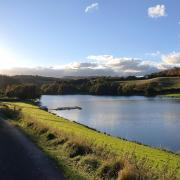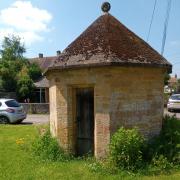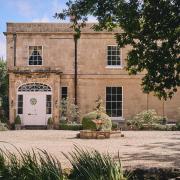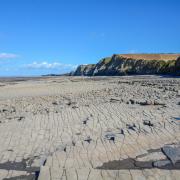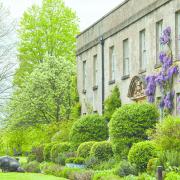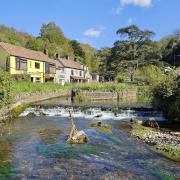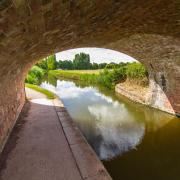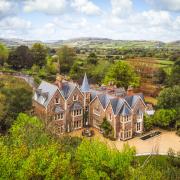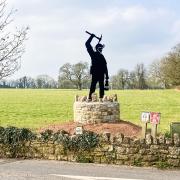A pure blue winter’s Saturday, is tantalising with its taste of spring, even though more winter is surely heading our way
Para-gliders drift and thermal over North Hill while a buzzard mews, alighting on a branch overlooking Bossington. A tree full of apples glows red in the sun, the mass of oaks on the ridge illuminated in perfect detail as the stream hurtles by, busy with its traffic of all the rains we’ve had (and are still having). We set off on the path to the old coastguard look-out at Hurlstone Point with its stunning view of Porlock Marsh and the headlands out west in the Bristol channel. It’s high tide and there’s a lovely scrunching roar of surf on Bossington beach unfurling all the way along the horseshoe of the bay. You get harbour porpoises and red-throated divers here but a scan of binoculars reveals only gulls today.
A week before we were stood near Watchet Quay at high tide. I’ve never seen the marina so brimful of water while, at the edge of the Quay, big waves boomed and pulsed beneath us surging up the Washford River and rising perilously close to the windows overlooking the water. Every so often a metal manhole cover shot off its mounting as a new wave bore under the road, detonating a fifteen-foot jet of water into the air.
Shrieking teenagers dared each other to go closer for the next big one which suddenly arrived with a violent whump and drenching splatter. Venturing down an alley near the chip-shop, we saw a four by four optimistically parked (who on earth would take such a risk?) as the tide lapped around its wheels. Darkness intensified the thrill and menace of the sea beyond the quay wall, which was cordoned off to the miles of bucking wilderness in the Channel.
And, back there at the marina, the statue of The Ancient Mariner with albatross tied around his neck and crossbow in hand as he stood with his back towards the Ocean. How appropriate Samuel Taylor Coleridge’s association with Watchet felt that night when you consider the poet’s weather-sensitivity, typified by a quote like this from one of his journals where he imagined a wayside poster – Playbills he called them - 'announcing each day the performance by his Supreme Majesty’s Servants, the Clouds, Waters, Sun, Moon, Stars.' Well, what a performance they were putting on that night. It was the same the next morning. Venturing unwisely to stand on a vantage point between waves I got royally drenched.
More rain as red sandstone bleeds down the lanes and faucets gushes out of hedge banks. Scrawny wet pheasants bob and duck out of the way, or press down for take-off, while a female blackbird launches herself into the foliage.
Last Sunday we’d ventured out to see the rook-roost nearby, picturing great cawing skeins and the ack-ack of jackdaws swirling over the trees near the bridle path. Last year I remember a frost-keen, duck-egg blue afterglow glowing molten near the horizon as the assemblage convened in an archetypal winter scene that stirred the blood. No such luck today, not a rook to be seen and yet another pile-driving shower pounding through the sodden woods where only a blue tit seemed alive near the rain-riveted pond. Yet there are robins singing and, this morning, a song thrush chipping out its first notes from a sculpture of spring-to-come: speckled knight from the dark soaking kingdoms of winter.
The pearl-tipped spears of snowdrops are pushing through and the witch-hazel gleams yellow with its hieroglyphs of blossom down the bottom of the garden. We wait for the next February performance of the weather gods on our little amphitheatre cupped between the Quantocks and Exmoor.




